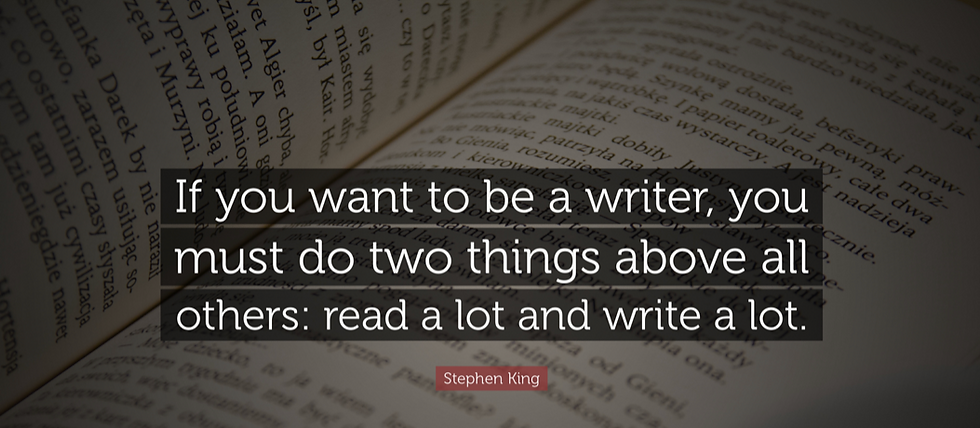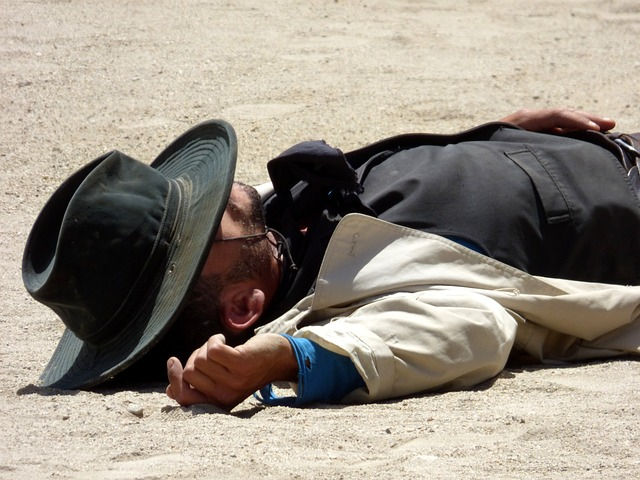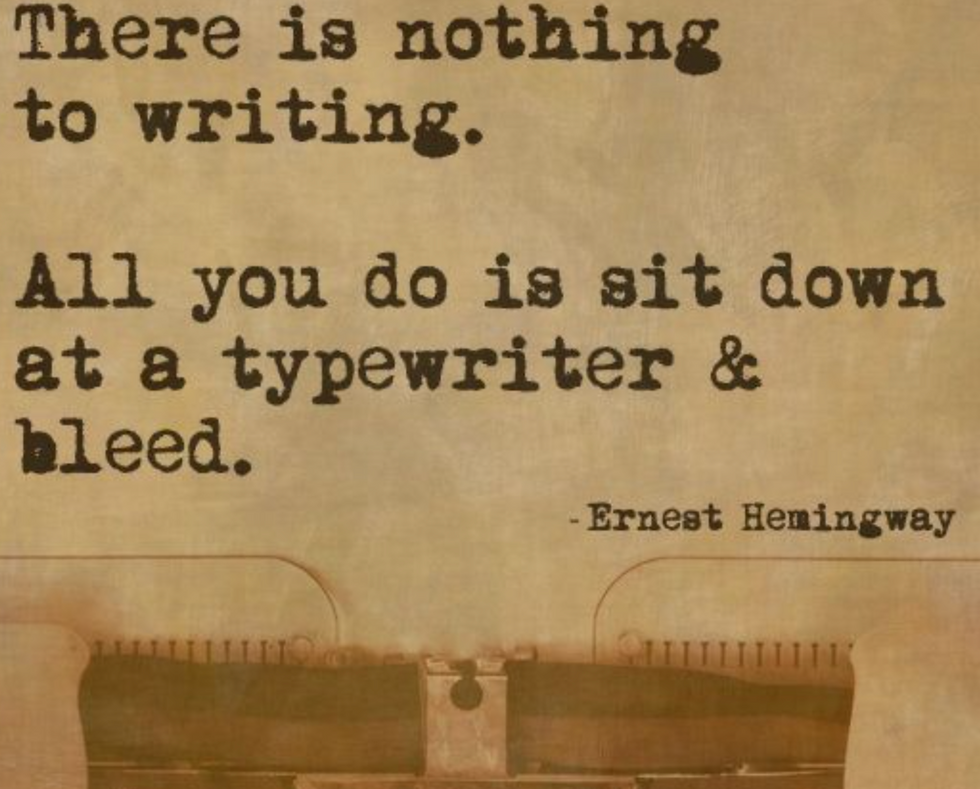How NOT to Write Like a Pretentious Braggart
- iw2write@gmail.com
- Apr 29, 2020
- 6 min read
So, you want to write. Congratulations!
Whether it’s a short story, novel, or screenplay, the vast, wide-open spaces are yours to write, create, change, and conclude. YOU are the storyteller; you have the creative power to build cities, lands, planets, populations, legends, myths, beasts, treasures, and fleets.
Whether it be a comedy, tragedy, epic, dramedy, tragicomic saga, science-fiction, or a blend of some – it’s yours to decide.
There have been about zillion books, give or take a few, about the art of writing, and this article certainly is not here to replace any of them. I did write it, however, to give you a few pointers to help you get started, without getting halted immediately by unexpected and needless clutter.
You can structure the story whichever way you want (once you’ve learned story structure of course). You do not have to adhere to rules, guidelines, ‘recommendations’ by the so-called gurus, etc.
Think of your story
What do you want to tell? What do you want to say? Who are the characters in your stories going to be? In what genre will it be (will get to that in a bit)? From where to where are they going? What kind of transformation will some, or all of them, go through? Will it have an upbeat ending or a downbeat ending?
It’s all up to you. Do not pander to your (potential) reading crowd just to please it. Don’t insert characters or dialogue just because you think “they’ll like it” or it’s “the sign of the times.”
“

It doesn’t matter what you write – just write
There’s an abundance of writing software, writing tools, writing aids, etc. etc. I myself still use good old Microsoft Word to write. I tried other writing software, and it’s just not for me – others may swear by them. The thing is, early in the process, find something that you’re comfortable with, and get going. Don’t start busying yourself too much with organizing stuff: You’ll find yourself, in the end, spending much more time on that than on actual writing. Remember, people did use to write before computers were invented, right?
Stay true to your vision
If and when a big-time Hollywood producer will want to make a movie out of your novel, story, novella, or whatever, there will be enough time to discuss changes. In almost all cases, what you write on paper at the start will be entirely different on the screen, but that’s a “problem” for another day. As the creator of the world, characters, and overall story – stick to your vision. Write your story first. Everything else will come later. In the end, there are plenty of ways to make your story read. But you have to write it first!

The First Step
The first step is, of course, the idea. There are millions of ideas floating out there, many of which have been written in one form or another, but that doesn’t mean you can’t put into writing your version of things. There’s always a good idea out there waiting to be discovered, waiting to be written or restructured in a new, imaginative way.
The Second Step
What genre is it in? A modern-day detective story? Cybercrime thriller? A case of mistaken identity suspenseful caper? Historical adventure? Fantasy?
Sometimes an idea will pop into your head, and you won’t know immediately right away what genre it belongs to. That’s okay – you could start it out as a modern-day detective story, and then realize it would work better in Victorian England, in the days of Jack the Ripper.
The third step
Start writing the skeleton of your story (aka structure): characters – main characters, side-characters, characters that may have secrets, villains that will turn out to be heroes and vice versa, love interests, etc. Places: Lands, countries, cities, etc. Did you come up with an end first? Write down the ending first, then the opening, then write out the filling in between. There are rules, but as we all know, rules are there to be broken. The trick is knowing when and where to break them – and if the cause justifies the break.
The key here is to get all your details as accurate and close to reality as possible (without infringing any copyright, of course), such as street names, etc. Geography, places, monuments, events, roads, etc. Unless, of course, you’re into the realm of wild fantasy, where anything goes: “And so, Mr. Jackson found himself on the corner of 42nd street and Xanadu Boulevard, humming a long-forgotten Eminem rap, when suddenly, strange, diamond-like drops began falling from the sky...”

What you can and can’t do:
Can:
Extend a previously written story into new territories. Take Alice in Wonderland, for example. Supposing, many years after the fact, the rabbit or mad hatter pays Alice a visit when she’s married and has children. They whisk her kids away into a fantastic world, and Alice reluctantly has to follow them.
A big no-no is to create characters that there was no inclination whatsoever to their existence. The best (worst?) example of this is someone who wrote about ‘Sherlock’s Holmes’s sister.’ If he had referenced to such a sister even once, or she was mentioned in general at all in any of his stories – well, that would be acceptable. However, there was no such mention. Sherlock Holmes never had a sister (Dr. Watson never mentioned one), so
Making one up two centuries later makes no sense. Everyone knows about Mycroft Holmes, of course, because the author, Sir Arthur Conan Doyle, mentioned him (actually extensively). Imagine if now, someone came up with the idea that Bruce Wayne (Batman) had a long-lost twin brother? It’s in a similar vein.
Example 2: In Treasure Island, Long John Silver mentions he has a wife. In theory, you can write a story that involves the wife, maybe even his child. Why? Because she is mentioned in the original story and is not a character created out of thin air.
This goes to films as well. Remember Titanic? Rose gets saved at the end, while Jack, literally, sinks in the icy waters. But what if the producers suddenly remember he had a long-lost twin, who reappears a few years after the tale?
Can’t
Stay away from clichés
The literary, as well as the cinematic/TV world, is plagued with tiresome clichés. Try to avoid them as much as possible, or twist them in new, interesting, and entertaining ways that will leave a mark in the reader’s mind.
This holds true to characters as well. Don’t give them corny clothes, dialogue, shoes, and so forth. Sadly, the last decade or so has seen, in movies at least, a rapid decline of intelligence in characterization, especially in movies.
Don’t cater to a specific audience:
One of the main problems of the latest Spider-Man movies (Into the Spider-Verse not included, because not only was it original, it was fresh, well-written and overall well-executed).
Don't bloat your work with fancy words that only you (and maybe a few others from the book club) will understand.
You want lots of people to read your words, right? So try not to make your work abstruse.
Rehash a classic story yet again – without anything original to add:
Someone had the ‘brilliant’ idea of making another Robin Hood movie. Needless to say, it was horrid. Why? One of the main reasons was because the filmmakers tried to infuse so-called modern ‘sensibilities’ (if there is such a thing) into the film. Example: When the villain gives Robin Hood the nickname ‘the hood.’ I mean, come on...
Of course, ‘anything original’ to add doesn’t mean that you suddenly turn Robin Hood into a superhuman being with flaming arrows that can pierce through entire armies. But, say, how about The Wizard of Oz where the tin man, cowardly lion, and scarecrow somehow make it into Dorothy’s world, and she has to help them back into their world?
Don’t be gross/profane/sexually explicit just for the sake of it:
We can’t all be writing Pulp Fictionesque stories, and while on some occasions the tale merits graphic descriptions, more often than not it doesn’t, and it could be jarring, off-putting, and just a distraction from the main story. An exception to this rule is, of course, the horror genre. Be humble What's true in life is certainly true in writing. That means knowing they'll be a first draft, second draft, and so on. Editing is a powerful, sometimes harsh, tool - but a necessary "evil." Be prepared to tear your work and rebuild it. Kill off your darlings. Eliminate favorite scenes. Be true to the story. Back up Back up, back up, back up your work! It's amazing how many people have lost their work because of improper backup. Get a flash drive and back up your work. Always.







Comments